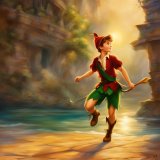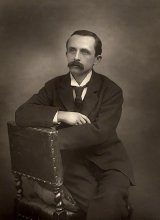Peter Pan Page #4
Peter Pan; or, the Boy Who Wouldn't Grow Up or Peter and Wendy is J. M. Barrie's most famous work, in the form of a 1904 play and a 1911 novel.
“I do,” she said, “I so want a third child.” “Boy or girl?” asked Michael, not too hopefully. “Boy.” Then he had leapt into her arms. Such a little thing for Mr. and Mrs. Darling and Nana to recall now, but not so little if that was to be Michael's last night in the nursery. They go on with their recollections. “It was then that I rushed in like a tornado, wasn't it?” Mr. Darling would say, scorning himself; and indeed he had been like a tornado. Perhaps there was some excuse for him. He, too, had been dressing for the party, and all had gone well with him until he came to his tie. It is an astounding thing to have to tell, but this man, though he knew about stocks and shares, had no real mastery of his tie. Sometimes the thing yielded to him without a contest, but there were occasions when it would have been better for the house if he had swallowed his pride and used a made-up tie. This was such an occasion. He came rushing into the nursery with the crumpled little brute of a tie in his hand. “Why, what is the matter, father dear?” “Matter!” he yelled; he really yelled. “This tie, it will not tie.” He became dangerously sarcastic. “Not round my neck! Round the bed-post! Oh yes, twenty times have I made it up round the bed-post, but round my neck, no! Oh dear no! begs to be excused!” He thought Mrs. Darling was not sufficiently impressed, and he went on sternly, “I warn you of this, mother, that unless this tie is round my neck we don't go out to dinner to-night, and if I don't go out to dinner to-night, I never go to the office again, and if I don't go to the office again, you and I starve, and our children will be flung into the streets.” Even then Mrs. Darling was placid. “Let me try, dear,” she said, and indeed that was what he had come to ask her to do, and with her nice cool hands she tied his tie for him, while the children stood around to see their fate decided. Some men would have resented her being able to do it so easily, but Mr. Darling had far too fine a nature for that; he thanked her carelessly, at once forgot his rage, and in another moment was dancing round the room with Michael on his back. “How wildly we romped!” says Mrs. Darling now, recalling it. “Our last romp!” Mr. Darling groaned. “O George, do you remember Michael suddenly said to me, 'How did you get to know me, mother?'” “I remember!” “They were rather sweet, don't you think, George?” “And they were ours, ours! and now they are gone.” The romp had ended with the appearance of Nana, and most unluckily Mr. Darling collided against her, covering his trousers with hairs. They were not only new trousers, but they were the first he had ever had with braid on them, and he had had to bite his lip to prevent the tears coming. Of course Mrs. Darling brushed him, but he began to talk again about its being a mistake to have a dog for a nurse. “George, Nana is a treasure.” “No doubt, but I have an uneasy feeling at times that she looks upon the children as puppies.” “Oh no, dear one, I feel sure she knows they have souls.” “I wonder,” Mr. Darling said thoughtfully, “I wonder.” It was an opportunity, his wife felt, for telling him about the boy. At first he pooh-poohed the story, but he became thoughtful when she showed him the shadow. “It is nobody I know,” he said, examining it carefully, “but it does look a scoundrel.” “We were still discussing it, you remember,” says Mr. Darling, “when Nana came in with Michael's medicine. You will never carry the bottle in your mouth again, Nana, and it is all my fault.” Strong man though he was, there is no doubt that he had behaved rather foolishly over the medicine. If he had a weakness, it was for thinking that all his life he had taken medicine boldly, and so now, when Michael dodged the spoon in Nana's mouth, he had said reprovingly, “Be a man, Michael.” “Won't; won't!” Michael cried naughtily. Mrs. Darling left the room to get a chocolate for him, and Mr. Darling thought this showed want of firmness. “Mother, don't pamper him,” he called after her. “Michael, when I was your age I took medicine without a murmur. I said, 'Thank you, kind parents, for giving me bottles to make me well.'” He really thought this was true, and Wendy, who was now in her night-gown, believed it also, and she said, to encourage Michael, “That medicine you sometimes take, father, is much nastier, isn't it?” “Ever so much nastier,” Mr. Darling said bravely, “and I would take it now as an example to you, Michael, if I hadn't lost the bottle.” He had not exactly lost it; he had climbed in the dead of night to the top of the wardrobe and hidden it there. What he did not know was that the faithful Liza had found it, and put it back on his wash-stand. “I know where it is, father,” Wendy cried, always glad to be of service. “I'll bring it,” and she was off before he could stop her. Immediately his spirits sank in the strangest way. “John,” he said, shuddering, “it's most beastly stuff. It's that nasty, sticky, sweet kind.” “It will soon be over, father,” John said cheerily, and then in rushed Wendy with the medicine in a glass. “I have been as quick as I could,” she panted. “You have been wonderfully quick,” her father retorted, with a vindictive politeness that was quite thrown away upon her. “Michael first,” he said doggedly. “Father first,” said Michael, who was of a suspicious nature. “I shall be sick, you know,” Mr. Darling said threateningly. “Come on, father,” said John. “Hold your tongue, John,” his father rapped out. Wendy was quite puzzled. “I thought you took it quite easily, father.” “That is not the point,” he retorted. “The point is, that there is more in my glass than in Michael's spoon.” His proud heart was nearly bursting. “And it isn't fair: I would say it though it were with my last breath; it isn't fair.” “Father, I am waiting,” said Michael coldly. “It's all very well to say you are waiting; so am I waiting.” “Father's a cowardly custard.” “So are you a cowardly custard.” “I'm not frightened.” “Neither am I frightened.” “Well, then, take it.” “Well, then, you take it.” Wendy had a splendid idea. “Why not both take it at the same time?” “Certainly,” said Mr. Darling. “Are you ready, Michael?” Wendy gave the words, one, two, three, and Michael took his medicine, but Mr. Darling slipped his behind his back. There was a yell of rage from Michael, and “O father!” Wendy exclaimed. “What do you mean by 'O father'?” Mr. Darling demanded. “Stop that row, Michael. I meant to take mine, but I--I missed it.” It was dreadful the way all the three were looking at him, just as if they did not admire him. “Look here, all of you,” he said entreatingly, as soon as Nana had gone into the bathroom. “I have just thought of a splendid joke. I shall pour my medicine into Nana's bowl, and she will drink it, thinking it is milk!” It was the colour of milk; but the children did not have their father's sense of humour, and they looked at him reproachfully as he poured the medicine into Nana's bowl. “What fun!” he said doubtfully, and they did not dare expose him when Mrs. Darling and Nana returned.
Translation
Translate and read this book in other languages:
Select another language:
- - Select -
- 简体中文 (Chinese - Simplified)
- 繁體中文 (Chinese - Traditional)
- Español (Spanish)
- Esperanto (Esperanto)
- 日本語 (Japanese)
- Português (Portuguese)
- Deutsch (German)
- العربية (Arabic)
- Français (French)
- Русский (Russian)
- ಕನ್ನಡ (Kannada)
- 한국어 (Korean)
- עברית (Hebrew)
- Gaeilge (Irish)
- Українська (Ukrainian)
- اردو (Urdu)
- Magyar (Hungarian)
- मानक हिन्दी (Hindi)
- Indonesia (Indonesian)
- Italiano (Italian)
- தமிழ் (Tamil)
- Türkçe (Turkish)
- తెలుగు (Telugu)
- ภาษาไทย (Thai)
- Tiếng Việt (Vietnamese)
- Čeština (Czech)
- Polski (Polish)
- Bahasa Indonesia (Indonesian)
- Românește (Romanian)
- Nederlands (Dutch)
- Ελληνικά (Greek)
- Latinum (Latin)
- Svenska (Swedish)
- Dansk (Danish)
- Suomi (Finnish)
- فارسی (Persian)
- ייִדיש (Yiddish)
- հայերեն (Armenian)
- Norsk (Norwegian)
- English (English)
Citation
Use the citation below to add this book to your bibliography:
Style:MLAChicagoAPA
"Peter Pan Books." Literature.com. STANDS4 LLC, 2024. Web. 23 Nov. 2024. <https://www.literature.com/book/peter_pan_12>.




Discuss this Peter Pan book with the community:
Report Comment
We're doing our best to make sure our content is useful, accurate and safe.
If by any chance you spot an inappropriate comment while navigating through our website please use this form to let us know, and we'll take care of it shortly.
Attachment
You need to be logged in to favorite.
Log In